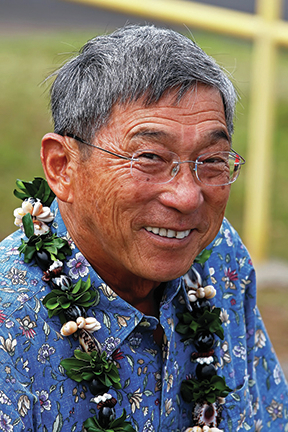KAILUA-KONA — Mayor Harry Kim on Saturday continued to promote his vision of a Mauna Kea “World Park,” announcing that Gov. David Ige has lent his support to the mayor’s vision for the mountain and that he is “pursuing how this can be done.”
KAILUA-KONA — Mayor Harry Kim on Saturday continued to promote his vision of a Mauna Kea “World Park,” announcing that Gov. David Ige has lent his support to the mayor’s vision for the mountain and that he is “pursuing how this can be done.”
Although the plan is still light on specifics for the park itself, Kim said the first step is figuring out exactly how the park could become a reality.
“I do want you to know that the governor said that I can express that he is part of these missions,” the mayor told attendees at the International Lunar Observatory Association Galaxy Forum 2017. “He accepts these missions of what he would like to see of Mauna Kea.”
Kim first put the park idea forward in December of last year.
According to a bulleted list titled “Vision for Mauna Kea,” Kim said Mauna Kea should promote” a pursuit of knowledge to make us a better people and better stewards of this land” and, additionally, be “the living museum of the people of the First Nation of Hawaii,” “an opportunity for Hawaii to be the center of discovery of mankind and of the universe” and “a monument for the world for peace on Earth.”
“Don’t we need some place on this Earth that the place and the people stand for that?” he asked.
After his presentation, Kim said the proposal is “a totally new concept,”and that Ige is exploring how the park can become a reality, including how it would be governed and the incorporation of the outlined missions.
But, he said, he can’t speak to specifics of what form the park would take.
“The first step is, how do you do this?” he said.
“Right now, (the governor) is just beginning to meet with people to see how can we achieve this. So know that, all right, and that’s where it is.”
The park’s creation wouldn’t affect any potential development of the Thirty Meter Telescope, saying the issue is to make the telescope “fit into this vision.”
During a panel discussion, Doug Simons, director of the Canada-France-Hawaii Telescope, called Kim “the real deal,” saying that he immediately connected with the proposal and calling it “intrinsically inclusive.”
“And it’s exactly aligned with where I think we need to go with all of this,” he added.
Donald Straney, chancellor of the University of Hawaii at Hilo stressed the importance of considering Mauna Kea holistically.
“It’s easy to think about what you do on Mauna Kea,” he said. “Doug (Simons) looks at stars; the people who look at rocks; I would go out; I want to see birds. Other people go up and they see cultural features that remind them of what their ancestors did. We have to think about Mauna Kea holistically.”




